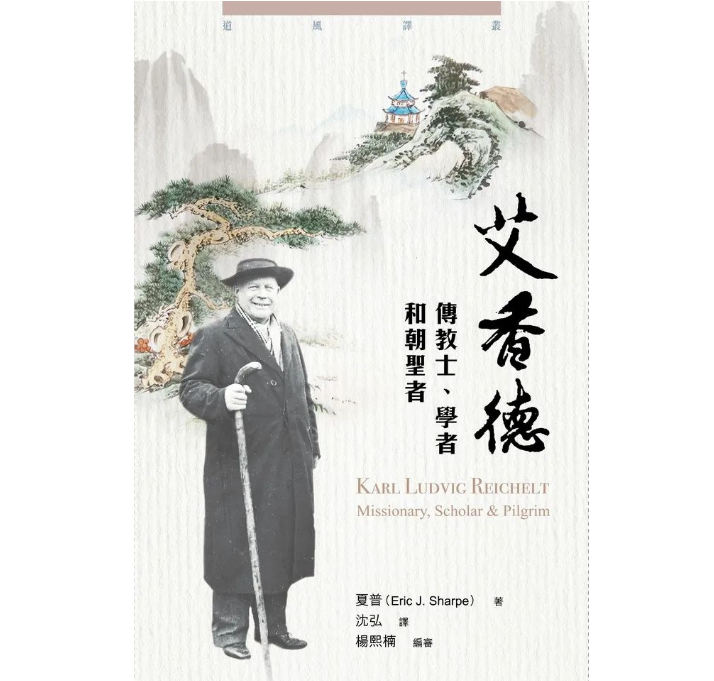Recently, the Chinese version of Karl Ludwig Reichelt: Missionary, Scholar & Pilgrim was published in Hong Kong.
On September 2, Logos and Pneuma Press paid tribute to Eric John Sharpe (1933-2000) who was a master of religious historiography in the 20th century and a pioneering scholar in the fields of religious phenomenology, modern Christian missionary history, and religious dialogue. His last work was a biography study of Indian Christians, which was both familiar and unfamiliar to Chinese churches: The Riddle of Sadhu Sundar Singh.
“This book was the author’s first biographical study. His writing route did not adopt the traditional chronicle method, but carried out shuttle research around the triple identities of Karl Ludvig Reichelt (the founder of the Tao Fong Shan Christian Centre) as a missionary, a scholar, and a pilgrim, highlighting his physical and mental struggles in various stages of his life, showing more people and things in different periods, and describing with flesh and blood how this extraordinary missionary embarked on an unprecedented new path of missionary work. From the perspective of Chinese theology, Karl Ludvig Reichelt and his Chinese and foreign colleagues were undoubtedly pioneers of Chinese theology.”
The book is divided into nine chapters. It goes on to introduce, “Compared with the original English version, the Chinese version has supplemented much reference data, including citation verification and annotation of Chinese and foreign names, places and events mentioned in the original, and attached precious historical pictures, especially the Jing Fong Shan work log (1922-1930) which was greatly updated, verified and annotated according to the Norwegian original, showing Reichelt’s career and ministry from multiple angles and in all directions.”
Shen Hong, the translator, is a doctor of philosophy from Peking University and a professor at the School of Foreign Languages at the International Culture and Exchange of Zhejiang University. Yang Xinan, the editor, is the founding director of the Institute of Chinese Christian Culture, the founding member of the China Studies Department at the Ambrose Society in Milan, and the chief planner of the Academic Library of Christian Thoughts in Past Dynasties. His research fields include Chinese theology, Bible study, and Nestorianism.
Logos and Pneuma Press also posted the “Editor’s Preface” by its director Yang Xinan in July 2021. He recalled reading this book more than twenty years ago. Yang became the ministry director and vice president of the Tao Fong Shan Christian Centre in June 1992. In the first three months of his tenure, he was at a loss for Tao Fong Shan, which was devastated at that time, and the library director at that time, Mr. He Xianglin, found Sharpe’s book on the shelf for him. He admitted that his English was not good, but the loan rate of this book was very high. Many Western pastors and theological students had a good evaluation of this book, and he felt bright when he read it.
“Because I was into the book, I was mentally and psychologically immersed into it. I read the whole book quickly for several days, but I didn’t see the positive benefits I expected. First, this book is a personal biography written by the author in the academic style, which is mixed with academic exposition and literature analysis. It takes a lot of time to understand and it is impossible to read it quickly. Both of them, because Sharpe was well versed in Nordic languages, and could understand the internal documents of the missionary society and Reichelt’s work log can be revealed that he was criticized and opposed by Chinese and foreign churches and missionary societies from time to time so he was exhausted from time to time. As a reader, I discovered that Reichelt had been wandering between heaven and hell, often in confusion and struggle.”
“Then, I focused my reading on the outgoing report of the former Nordic Dean Ernst Harbakk of the Tao Fong Shan Christian Centre. Under his inspiration, I comprehensively explored the four directions of the Center: ‘theological research, retreats, Chinese Christian art, and religious dialogue’. Three years later, Professor Liu Xiaofeng and I chose the direction of ‘theological research‘ and set up an independent academic institution to promote ‘Chinese theology’ with the ambition to concentrate on one thing. The institution was named ‘Chinese Christian Culture Institute (CCCI).’
“Time flies, I have been in the Tao Fong Shan Christian Centre for twenty-nine years. Five years ago, I had a plan to translate Sharpe’s classic book into Chinese. The selection of translators was also quite dramatic. Just like Galatians 4:4, “But when the time had fully come,” and it was fulfilled. In 2017, Dr. Shen Hong, a senior professor in the humanities department of Zhejiang University, became a visiting scholar at CCCI and lived in the Tao Fong Shan for three months. His visiting research topic was the relationship between medieval literature and Christian doctrine. During Professor Shen’s visit, I discovered that he had done extensive research on the history and old photos of modern missionaries, and his works were fruitful. It just so happened that I had been sorting out and compiling the history and old photos of the Tao Fong Shan for the past ten years, and our daily conversations naturally revolved around this topic. I thought, Professor Shen Hong was really the best choice for translating Sharpe’s book, but as a well-known scholar, he must have had many important research topics on his hands. It was almost impossible for me to invite him to translate, and the translation work was not regarded as academic research achievement by universities. After knowing my intention, Professor Shen unexpectedly agreed to my invitation at the end of his three-month visit. The reason was simple and unique: like-mindedness is more valuable than fortune and fame.”
“The publication of this book aims to celebrate the ninetieth anniversary of the Tao Fong Shan and the 25th anniversary of CCCI. On the eightieth anniversary of the Tao Fong Shan, I edited and published The Wind Blows with the Will- Karl Ludvig Reichelt and Chinese Theology. The anthology of that year was mainly based on the research papers of scholars from Norway and the three places on both sides of the Taiwan Straits.”
- Translated by Charlie Li












